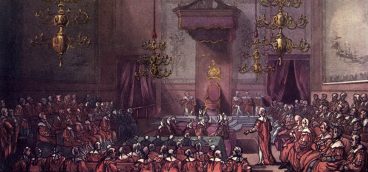Selling the Castle

If you want to be called Lord Joe, Earl of Arran, you have to own Lochranza Castle and about 1,000 acres surrounding it.
The castle was built in the early 1200s and in 1262 King Alexander III granted the castle and its lands to Walter Stewart, the Earl of Menteith. Robert the Bruce supposedly hid in the castle in 1306 while he was en route from Ireland to Scotland to claim the throne. As noted earlier, the earldom came into Lady Jean’s family in 1503.
Today, the castle is a ruin, but, ruin or not, you need to own it to be the Earl of Arran. So Lady Jean set up an auction at Lochranza to sell the title, and she set an alarmingly high reserve price.
Meanwhile, my friend, Joe, intent on snagging the earldom, had found his way to Arran for the auction. As you probably know, you don’t go from being a middle class kid to being on the Forbes 400 list by being slow on the uptake, and Joe was certainly not slow on the uptake.
He sat quietly in the back of the auction hall with his Scottish solicitor and watched the progress of the auction, not bidding at all. There were only two serious bidders, and as the price rose and rose they gradually lost interest. The auctioneer did his best, but eventually he announced that the reserve price had not been exceeded and that there would be no sale.
Still, Joe bided his time. He watched as the auctioneer walked to the corner of the room, picked up the phone and called Lady Jean to give her the bad news. It was only after the auctioneer hung up that Joe leapt into action.
Joe’s solicitor buttonholed the auctioneer and announced that his client wished to make an offer for the earldom. The confused auctioneer explained that the auction was closed.
“We are not making a bid, sir, we are making an offer. I expect you to communicate it to Lady Jean.”
Joe’s offer was well below the reserve price, but it was also way above the last bid. More important, Joe’s reading of the psychological moment had been perfect. When Lady Jean had gotten the call saying the earldom hadn’t sold, she’d gone into a blue funk. As she told me later, when the phone rang a second time she was in the process of storming around her living room kicking things.
But now, when the call came with the new offer, Lady Jean jumped at it and the deal was sealed. Later, Lady Jean insisted on knowing who the buyer was, “So I will know the earldom is in good hands.” But Joe wanted anonymity and that’s what he got.
Lady Jean was unhappy about not knowing who the buyer was, but on the other hand she was bucks up for the first time in decades. She spent much of the money to have central heating installed in her home.
The idea that a British aristocrat would sell an earldom so she could heat her house was so quixotic that it made international headlines (e.g., here), much to Lady Jean’s distress. But that idea was quixotic only to someone who had never spent a night in a second-floor bedroom at Strabane.
Negative subtle maneuvers
Like most women of her generation—and especially among the aristocracy—Lady Jean had never been taught anything about business or finance. It was simply assumed that there would always be a husband in the picture to handle those sorts of boring matters.
But Lady Jean was divorced way back in 1957 and she never remarried, meaning that for many years there had been no competent oversight of Arran.
To make matters worse, Lady Jean possessed a very strong sense of civic duty—she was a member of a generation for whom noblesse oblige meant something positive. She could not, in fact, say no to any request and as a result she served on dozens of committees, boards, institutes, councils, clubs, etc.
Lady Jean seems to have inherited her sense of duty from her mother, the Duchess of Montrose. But the Duchess had a husband—Lady Jean’s father, the 6th Duke of Montrose—and Lady Jean did not. The Duke himself tried to warn Lady Jean. “In assisting good works it is easy to become too busy and so achieve little,” he told her.
But the Duke’s words fell on deaf ears. In fact, Lady Jean became the living embodiment of the notorious Mrs. Jellyby of Dickens’ “Bleak House.” As you will recall, Mrs. J devoted all her waking hours to good works, while her own neglected children went barefoot and hungry.
As Lady Jean eventually put it herself, “I made a mistake in doing too much voluntary work. I was trying to accomplish far too much, while neglecting to realize what was happening to Arran.”
Perhaps worst of all was Lady Jean’s credulous view of human nature—she simply assumed that everyone was as honest and forthright as she was. No matter how often her experiences demonstrated that this view was badly misplaced, Lady Jean clung stubbornly to it.
The net result, over the course of thirty or forty years after Lady Jean’s divorce, was that many of her tenants were dishonest, many of her employees were corrupt, the Trustees of the Arran and Easton Trust had gone sclerotic, and her (former) attorneys were major bozos.
Some of Lady Jean’s employees stole her furniture and her timber; some overseers stole her cash flow; some tenants stole her jewelry and clothes and riffled thru her private accounts; some stockmen so neglected her herds that some animals died of neglect while others simply disappeared into thin air.
Many of these disasters were brought down on Lady Jean’s head by no one other than Lady Jean herself. But some were brought down on her head by none other than the British House of Commons, as we’ll see next week.








